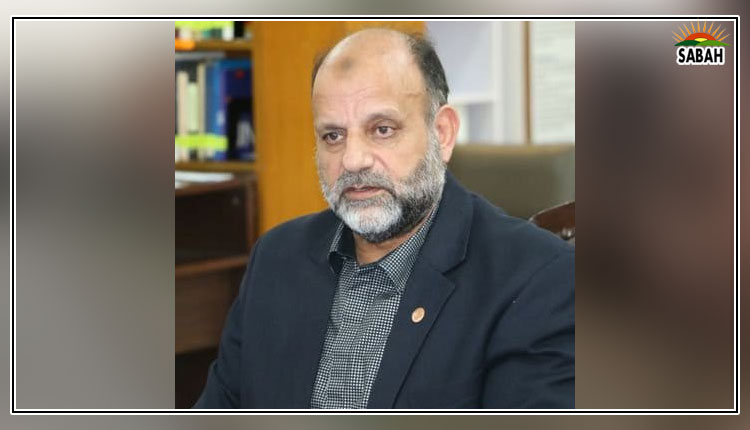Former senator, federal minister & economist Professor Khurshid Ahmad passes away in UK
LONDON, April 13 (SABAH): Professor Khurshid Ahmad, the scholarly heir of Syed Abul A’la Maududi and a prominent leader of Jamaat-e-Islami, has passed away in the UK. A former Senator and Federal Minister for Energy, he was also a renowned economist and founder of both the Institute of Policy Studies in Islamabad and the Islamic Foundation in the UK.

Born on March 23, 1932, in Delhi, Professor Ahmad earned a graduate degree in Law and its fundamentals, and Master’s degrees in Economics and Islamic Studies. He was also awarded an honorary degree in Education by the university.

He joined Islami Jamiat-e-Talaba in 1949 and became its Naazm-e-Ahla in 1953. In 1956, he formally became a member of Jamaat-e-Islami. He was elected to the Senate of Pakistan in 1985, 1997, and 2002, where he also served as Chairman of the Standing Committee on Economic Affairs and Planning.

In 1978, Professor Ahmad was appointed as Federal Minister for Planning and Development, and also served as Deputy Chairman of Pakistan’s Planning Commission.
 As an academic, he taught at the University of Karachi from 1955 to 1958 and later served as a research scholar at the University of Leicester. From 1983 to 1987, he chaired the International Institute of Islamic Economics at the International Islamic University Islamabad.
As an academic, he taught at the University of Karachi from 1955 to 1958 and later served as a research scholar at the University of Leicester. From 1983 to 1987, he chaired the International Institute of Islamic Economics at the International Islamic University Islamabad.
 He was also a member of the advisory board of the International Centre for Research in Islamic Economics, Leicester (1984–1992), and Vice President of King Abdulaziz University in Jeddah from 1979 to 1983.
He was also a member of the advisory board of the International Centre for Research in Islamic Economics, Leicester (1984–1992), and Vice President of King Abdulaziz University in Jeddah from 1979 to 1983.

Alongside his academic pursuits, he was a passionate collector of books. By 1965, he had a personal library of over 20,000 books, some of which he donated to the Islamic Research Academy in Karachi. In London, he had around 7,000 to 8,000 books, most of which were donated to the Islamic Centre Foundation. Many of his books were also entrusted to the Institute of Policy Studies in Islamabad.

Professor Ahmad made significant contributions to the fields of Islam, education, global economics, and Islamic social systems, earning him international acclaim. In recognition of his academic services, he was honored with numerous awards and accolades by countries, institutions, and organizations around the world.

He participated in over 100 international conferences and seminars either as a delegate or representative. He was the pioneer in establishing Islamic Economics as an academic discipline. For this groundbreaking work, he was awarded the first Islamic Development Bank Award in 1988. In 1990, he received the prestigious King Faisal International Award.

In 1990, he received the highest award from an Islamic bank for his exceptional work in Islamic economics, and the same year, the Saudi government awarded him the King Faisal Award for his services to the global Islamic community. In 2010, the Government of Pakistan conferred upon him the country’s highest civilian award, the Nishan-e-Imtiaz.

Doctoral theses have been written on his work in prestigious universities across Malaysia, Turkey, and Germany. In recognition of his academic and research services, the University of Malaya (Malaysia) awarded him an honorary Ph.D. in 1982; Loughborough University (UK) in 1983 for education; and the National University of Malaysia in 2003 and 2006 for his contributions to Islamic Economics and Literature.

He also served as editor of several scholarly journals and magazines on ideological subjects and authored over seventy books in Urdu and English. Despite his numerous engagements, he continued to serve as the editor of Tarjuman-ul-Quran, the official monthly journal of Jamaat-e-Islami.

Professor Khurshid Ahmad was the founding chairman of two key institutions: the Institute of Policy Studies in Islamabad and the Islamic Foundation in Leicester, UK. He was a board member of the Islamic Centre Zaria (Nigeria), the International Islamic University Islamabad, the Foundation Council of the Royal Academy for Islamic Civilization in Amman, and served as Vice President of the Islamic Research Academies in Karachi and Lahore. His passing marks the end of a remarkable chapter in the world of Islamic scholarship & economic thought.













